- Home
- Julie Hyzy
Grace Against the Clock (A Manor House Mystery) Page 10
Grace Against the Clock (A Manor House Mystery) Read online
Page 10
Even though that message didn’t offer a clue as to what she needed me for, I suspected that it had to do with the removal of the workbench in the basement. I hoped no one had been hurt.
I made it down there, my heels clunking on the bare steps, announcing my arrival. In the far end of the basement I could hear people chatting. Quite a few people, from the sound of it. The hum of conversation quieted enough for me to realize that they were aware of my approach.
Hillary came around from the front of the basement, hurrying on her own near-stiletto heels, to meet me in the laundry area.
“I’m so glad you’re here,” she said, taking me aback with her eagerness. Never in my life would I have expected Hillary to say those words to me.
She must have felt it, too, because she stopped, gave a peculiar twitch, and began again. “We have something to show you.”
“Where’s Bootsie?” I asked.
She pointed. “I locked her upstairs in your bedroom. I hope you don’t mind. I had her on the leash for a while but things have gotten crazy here and I didn’t want her to get hurt.”
I opened my mouth, but she interrupted.
“She has food, water, and a litter box. I made sure.”
“I appreciate that.”
Before I could ask what had caused the craziness and, presumably, the text that had rushed me home, she waved a manicured hand. “Come on. You’ve got to see this.”
Intrigued, and a little uneasy, I followed her and the sound of conversation, to the front of my house.
The “crowd” consisted of three men in dusty jeans and T-shirts: the construction foreman, who I’d met a few times; Wes from the historical society; and Larry the Locksmith. There was a name I never forgot. He was on speed dial at Marshfield because we had so many antique locks that required regular maintenance, and he’d helped me here at home with an antique lock issue I’d encountered several months ago.
As I followed Hillary deeper into their midst, I started to ask “What’s up?”
The question died on my lips. The workbench had been reduced to a haphazard pile of stained, moldy wood on the basement floor, the smell of which caused me to bring my hand to my nose. But it was what had been revealed on the wall behind it that left me speechless.
Curiosity drew me closer. Notwithstanding Scott’s wishful imagings from the evening before, I’d expected the aged structure to have been hiding nothing more exciting than plumbing pipes. Nothing like this.
“It’s a door,” I said, unnecessarily. The group of onlookers waited with patient smiles. Clearly, they’d come to that obvious conclusion well before I’d returned home. “Wow,” I said, and reached to skim my fingers over the cool, black-painted metal. Iron, I guessed. Set about a foot up from the ground, the door was about two and a half feet wide by three feet tall, looking a lot like the sort of closure one might see between sections of a submarine. Except, instead of jutting into the room the way a vault door might, this was flush with the wall. “Amazing.”
“You see why I called you,” Hillary said.
“Yeah.” The door’s handle was a thick pull-ring, counter-sunk in a hole. I lifted the rusty metal, which responded with grating disapproval. I tugged; the door didn’t budge. I ran my fingers over the lock positioned immediately above the handle.
“That’s why you’re here, I take it?” I said to Larry.
“Unless you happen to have an old key about yea big.” He held his index fingers about four inches apart. “It looks like I have a challenge on my hands.”
“No key that I know of,” I said. “This is all news to me.”
Hillary fairly gushed. “You see what wonderful surprises my home renovations can bring?”
Chapter 14
Because I couldn’t produce a key, there was little to be done at the moment, and because Larry needed different tools than he’d brought along on this trip, we all agreed to wait until tomorrow for the momentous door opening. I practically bounced with excitement. A secret door. In my own home. The thought made me giddy.
I remembered being enthralled, back when I was a young girl, with a special on television featuring a reporter opening up Al Capone’s vault. The event had been spotlighted in the news for weeks and the country was antsy with anticipation. My mom, in particular, had been breathless awaiting the great unveiling. She’d insisted that the whole family gather together to watch.
Even though Geraldo Rivera must have been shocked when he opened the vault and found nothing, I don’t believe his disappointment was nearly as acute as my mother’s. My mother’s father—or the man who, up until recently, I’d believed was her father—had had a dubious connection to the late mobster. Even though my mom didn’t much care for her father-of-record personally, she’d always been interested in histories of the shady characters he’d purportedly hung out with.
My dad teased her about the empty vault for a long time following the broadcast. In that case, at least, I think she may have gotten off easier than Geraldo Rivera did.
“We’ll have more answers tomorrow,” Hillary said as she shooed some of the workers out.
While nothing had come of the Geraldo Rivera extravaganza or my mother’s unlikely connection to whatever she thought may have been secreted in the vault, the experience—the crushing disappointment—had left an indelible impression on me.
An optimist by nature, I’d come to realize that I never truly counted on something now until it was a done deal.
This time, the promise in question—of what? adventure? exhilaration? treasure?—sat behind a locked door in my basement. Where some homeowners might envision stacks of cash secreted behind it, I expected to find little more than an outdated coal bin. But even that was a little thrilling.
As Larry finished packing up his tools, he promised to get back to my house the next day as soon as he was free. “I have a couple of other appointments,” he said. “You understand.”
Hillary looked as though she was about to tell him to ignore those other appointments and make this his priority, but I stepped in. “Whatever is back there has been waiting to be discovered for a very long time. I don’t think another day or so is going to hurt anyone.”
Hillary wrinkled her nose.
When Larry left, Wes pointed to the blueprints lying on a nearby table. “Frederick called and asked me to bring these by again, just in case.” He pointed. “I stuck around when things got exciting. None of us can find anything on file that describes that door, or hints at what could be behind it. Do you want me to take these back with me, or do you want to hold on to them here for tonight, in case there’s something I missed?”
I was about to tell him that he could take the blueprints back, but Hillary jumped in before I could get a word out. “Leave them here, Wes. If you don’t mind. Knowing Grace, she’ll probably want to study them herself, to make sure we haven’t missed anything.”
“No problem,” he said. “You guys have been good about keeping them safe. Let me know when you want me to pick them up.”
“Thank you, Wes,” Hillary said, placing a hand on the man’s arm. “You are such a sweetie.”
I saw them out, and when the house was finally empty again, I scooped Bootsie up and returned to the basement to give the door a longer look. “What do you think is back there?” I asked as I scratched behind her ears. As though answering me, she delivered a long, vocal meow with such conviction that if I could have understood cat-speak, I think I would have had my answer.
Later that night, when Bruce and Scott returned home, I didn’t tell them why, but suggested they both follow me downstairs again.
“Seems as though we’re spending a lot of time in the basement lately,” Bruce said. “Except for doing laundry, I don’t believe I’ve ever made this many trips down since we’ve lived here.”
“After tomorrow,” I said, adopting my most mysterious to
ne, “we may have a whole new reason to visit the basement.”
“What’s happening tomorrow?” Scott asked.
Holding Bootsie again, I led them to the front of the house, into the nook where the workbench had once stood. “See for yourselves.”
“Whoa,” Bruce said. He gave me an inquisitive look before reaching for the handle. “May I?”
Scott had taken an involuntary step back. “What’s in there?”
“It’s locked,” I said unnecessarily because, by that point, Bruce had given the counter-set ring a hearty tug. “Larry the Locksmith said he should be able to get it open tomorrow.”
“You are full of surprises, Grace,” Bruce said. “You and this house.”
“First you find out that you’re Bennett Marshfield’s niece,” Scott began.
I held up a finger, which Bootsie tried to swat. “That hasn’t been proved yet.”
My roommates shot me such immediate and similar “give me a break” looks that I would have bet they’d practiced in a mirror.
“Well, it hasn’t,” I said, but my words sounded lame, even to me. Changing the subject back to the matter at hand, I said, “Do you want me to call you when Larry gets here?”
“Yes,” they said in unison, the way people often say “Duh!”
“Wes left the blueprints again,” I said, nodding toward the large sheets lying nearby. “He couldn’t find anything on the plans that indicated a door here.” As I pointed, Bootsie squirmed out of my arms to land silently on the floor. “He did mention that if we can determine when the door was installed, we may be able to do research on the home’s owner at that time. He said he’d help me with that.”
Scott’s eyebrows rose. “Interesting. Does Adam have anything to worry about?”
I hadn’t even thought of Wes’s offer in those terms. “No,” I said. “He’s simply being nice. There’s nothing there.”
“That’s what you said about Adam at first, too,” Scott reminded me. When I reacted, he went on, “I’m not telling you this to make you uncomfortable,” he said, “but you’re a catch, Grace, and without Adam around here regularly, no one really knows about him.” He held both hands up and shrugged. “I’m only saying it because you tend to be blindsided when you find out a man is interested in you. I want you to be ready this time, in case I’m right.”
“Do you even know Wes?” I asked.
Bruce scratched his chin, clearly taking up Scott’s train of thought. “Let’s see, he’s close enough to your age to be a prospect. A smidge older, maybe. Interested in history and artifacts the way you are. Pretty sure he’s single.”
“He’s a widower,” I said.
They both cringed. “Oh,” Bruce said. “I’m sorry to hear that. Recent?”
“Not really. He moved here from out West a few years ago.”
“Years ago? Then he’s fair game, Grace. And I’ve never seen him with anyone else,” Scott added. “Romantically, I mean.”
“Do you two make it your business to know who in town is attached and who isn’t?”
Bruce seemed surprised by the question. “Not on purpose. Remember, though, Amethyst Cellars is right on Main Street. We’re always talking with people: tourists, neighbors, people who don’t even drink wine. You get to know a little bit about everybody.”
I’d been fairly clueless in the past where it came to matters of the heart. Maybe my roommates were right. I decided right then to be sure to drop Adam’s name into my next conversation with Wes. “Got it, thanks,” I said. “I am officially forewarned.”
“Not that there’s anything wrong with Wes, you understand,” Scott said. “But we know you’re not the type to lead a man on if you’re not interested in him.”
“Thanks,” I said again. “I’m lucky you guys have my back.”
* * *
The next morning, on my way to work I stopped by the historical society to drop off the blueprints. Hillary hadn’t been mistaken about my wanting to study these further, but I hadn’t done much more than scan them last night. I’d originally wished she’d taken Wes up on his offer to grab them, thereby sparing me the trip, but Scott’s and Bruce’s warnings—unlikely as their suppositions were—made me see it as an opportunity to let Wes know that I was seeing someone.
“Good morning,” he said as I entered the musty storefront. Smiling broadly, he came around the counter to take the blueprints from my arms. “Twice in one week. How did I get so lucky?”
It could have been politeness on his part, and I was betting that’s all it was. Still, the thought that he may have meant it flirtatiously rendered me tongue-tied. I couldn’t find a proper segue into the topic of my love life without making it feel forced. Instead, I asked if he’d seen David Cherk recently. Knowing that Flynn was treating Dr. Keay’s death as a homicide made me want to question our resident Dracula a bit more.
“Oddest thing,” Wes said as he returned the house plans to their drawer. “He came in yesterday and hurried out, barely speaking a word.”
“Is that unusual for him?”
“Yes and no,” Wes said. “Because we employ him from time to time, he’s generally pretty chatty. This time, though, he seemed to be in a hurry.”
Instinctively, my gaze shot to the nearby desk. “And he took that jar with him? The one you thought might be photo developer?”
“And the rattling box, too.” Wes shrugged.
“Maybe he is out taking pictures then,” I said. “I’m disappointed. I wanted to talk with him a little more about the events of Saturday night.”
Wes’s expression tightened. “That detective Flynn was here looking for him, too.”
“Oh?” I said. I wasn’t sure how much Flynn had shared with Wes so I let him lead the conversation.
“Word was Dr. Keay died of a heart attack. Now Detective Flynn is saying that it was murder.”
“Yeah,” I said. “They’re treating as a homicide.”
Wes lowered his voice, even though there was no one there to hear us. “I got the impression that the detective thinks David might have had something to do with Dr. Keay’s death.”
“Flynn has that effect on people. I don’t mean to downplay his investigation, because it’s possible that Flynn has more evidence than he’s choosing to share with me, but he does come on strong with everyone he questions.” I thought about my past interactions with the man. “David Cherk doesn’t strike me as a murderer.”
“Me neither,” Wes said. “He’s eccentric, but hardly dangerous.”
“The thing I want to know,” I said, “is that if Dr. Keay was murdered—and the coroner says he was—how could it possibly have happened? We were in the middle of a bustling, crowded event. Dr. Keay never left the premises and no one saw him being attacked.”
Wes shrugged. He looked as helpless as I felt.
“David said he checked behind the stage and Dr. Keay wasn’t there,” I continued. “And yet, a short while later, that’s where he appeared from. It makes no sense.”
“You were there when it happened?”
“I was,” I said, replaying the scene in my mind. The story had been spreading like wildfire around Emberstowne and I welcomed the chance to share what I considered the most accurate version. “Keay had been alone behind the stage. My assistant, Frances, had the good sense to take a look back there while we were trying to help revive him. According to Flynn, Keay had defensive wounds and bruises. Yet how can that be? No one saw an altercation between the doctor and anyone else. It’s impossible.” I stopped for a moment to take a breath. “The only clue we have is that when Dr. Keay collapsed he said one word: injection.”
“Injection?” Wes asked. “Was he a diabetic?”
“That was my first question. He wasn’t. Apparently he was trying to tell us that he’d been injected with booze.”
“Was Dr. Keay an alcoholi
c?”
“So I’ve been told,” I said.
“Could he have injected himself?”
“Why would he do that? And how to explain the defensive wounds?”
“Good point.” Wes looked thoughtful. “I’m no detective, but shouldn’t they be looking for whoever had a motive for killing Dr. Keay? Mind you, from what I’ve heard of the man, everybody loved him.”
I was wondering the same thing, thinking about Frances’s disclosure that Keay had been trying to force Joyce Swedburg out of their marital home, when Wes very nearly echoed my thoughts.
“The only person I can think of is his ex-wife. She’s been in here a lot lately”—he gestured to encompass the area—“and made no secret of the fact that she wished he would drop dead.”
“Seriously? Why was she here, if I may ask?”
“She wanted to go through blueprints and house plans. She said that if she had to move, she wanted to build new. She needed inspiration. Still, real estate isn’t much of a reason to actually kill a person, is it?”
“You’d be surprised at motives,” I said, enjoying the banter with Wes more than I’d anticipated. “But there’s one thing we’re forgetting.”
“What’s that?”
“Joyce wasn’t there that night. She’d gotten food poisoning and had to cancel. After all that work.”
“Joyce wasn’t there?” Wes repeated. “I thought she was in charge of the event. When she talked about it, you’d think it was the only thing of importance in her life this year. Besides being forced to move, that is.”
“Nope. She was taken ill,” I said. “In fact, I have no idea if she’s recovered. Nor any idea how she took the news of Keay’s death.” I made a mental note to ask Bennett how that conversation had gone. I made a second mental note to ask Flynn if he’d spoken with the woman. There was no possible way she could have killed her ex-husband, not unless she possessed magical powers that allowed her to walk through walls or move about in a crowd unseen. Still, she could have hired someone to do it for her. I wanted to talk with her if I could manage it; she might shed light on who else may have held a grudge against the illustrious Dr. Keay.

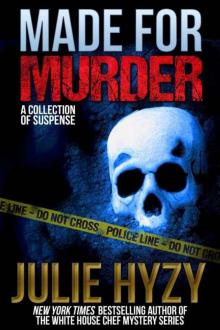 Made for Murder
Made for Murder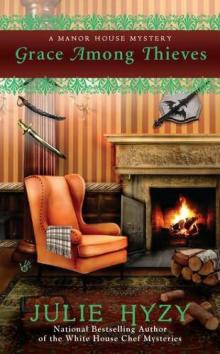 Grace Among Thieves
Grace Among Thieves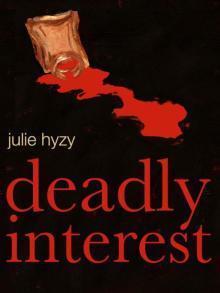 Deadly Interest
Deadly Interest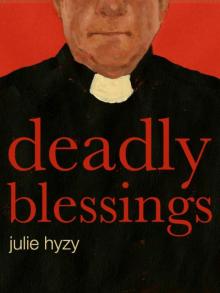 Deadly Blessings
Deadly Blessings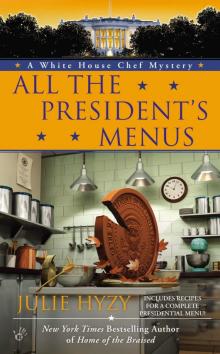 All the President’s Menus
All the President’s Menus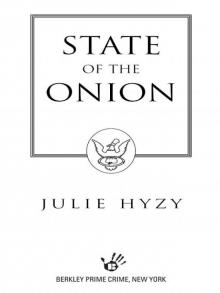 State of the Onion
State of the Onion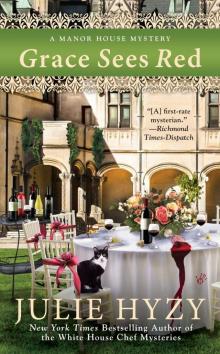 Grace Sees Red
Grace Sees Red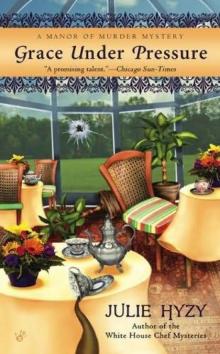 Whitehouse Chef 04 - Grace Under Pressure
Whitehouse Chef 04 - Grace Under Pressure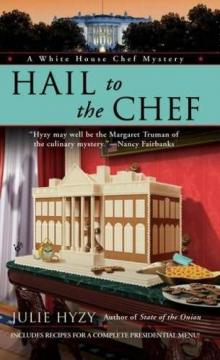 Hail to the Chef
Hail to the Chef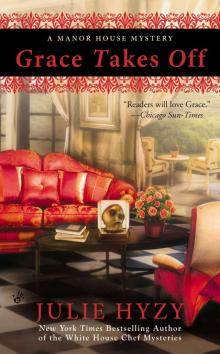 Grace Takes Off
Grace Takes Off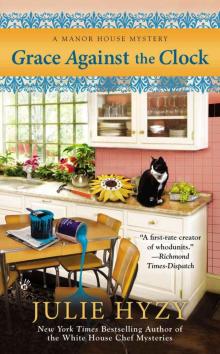 Grace Against the Clock (A Manor House Mystery)
Grace Against the Clock (A Manor House Mystery)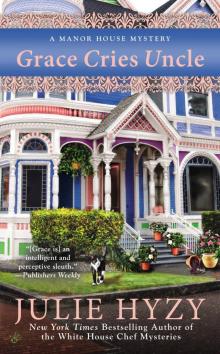 Grace Cries Uncle
Grace Cries Uncle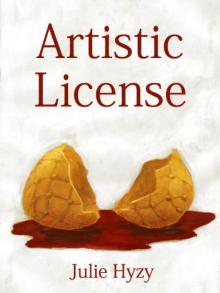 Artistic License
Artistic License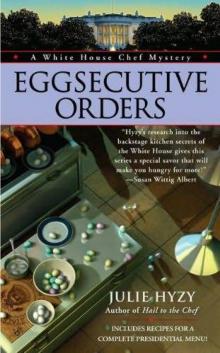 Eggsecutive Orders
Eggsecutive Orders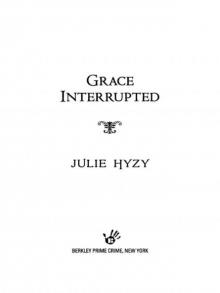 Grace Interrupted
Grace Interrupted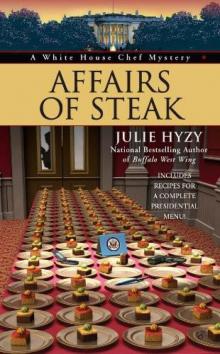 Affairs of Steak
Affairs of Steak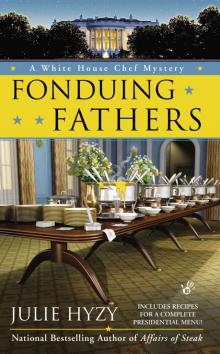 Fonduing Fathers
Fonduing Fathers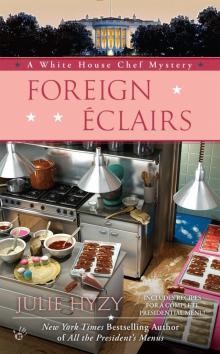 Foreign Éclairs
Foreign Éclairs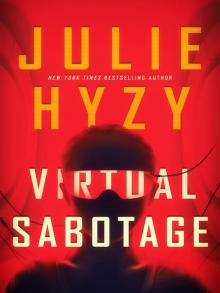 Virtual Sabotage
Virtual Sabotage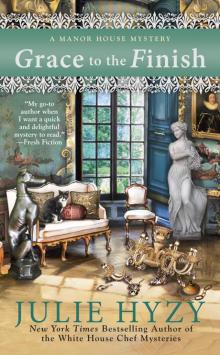 Grace to the Finish
Grace to the Finish